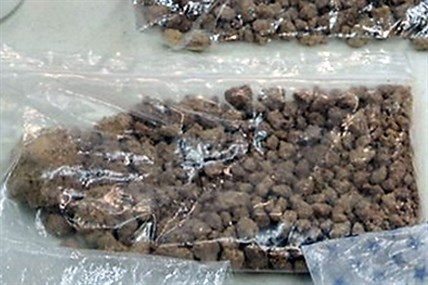
Fentanyl-laced heroin is becoming more common in the Okanagan, according to the owner of a Kelowna addiction centre.
Image Credit: Kelowna RCMP
January 08, 2015 - 11:24 AM
KELOWNA – The Fentanyl-laced heroin that killed two people in Vernon this week is also in Kelowna – and it’s not just a single bad batch but an alarming new trend.
On Monday Vernon-North Okanagan RCMP issued a warning to the community that an especially potent form of heroin killed a 49-year-old man. A few days later more people were taken to hospital with similar symptoms and a 29-year-old man was found dead in his home. Police say the overdoses were caused by a batch of Fentanyl-laced heroin.
Doug MacKenzie, the owner of Options Okanagan Treatment Centre in Kelowna, says it's no anomaly and that over the past six months the number of opiate-related calls to his treatment centre have increased dramatically.
He estimates as recently as a year ago opiate calls made up only 15 per cent. Within the last six months however, that ratio has jumped to 60 per cent.
“If you made pizzas and all of a sudden a new pizza made up 60 per cent of your sales you’d have to take notice,” he says. “Now my referral agents and myself are seeing 60 per cent of our phone calls are opiate related and we’re wondering what is happening.”
One likely reason, MacKenzie says, is that Fentanyl, a synthetic form of heroin but many times more potent, is more readily available thanks to a spike in demand from users who became addicted after it was prescribed by their doctors.
“We don’t see pure heroin much anymore,” he says. “It’s cheaper to go to Fentanyl. (Doctors) start them on one pain med and start switching them around. If they end up on Oxycontin or Fentanyl, good luck getting off of it.”
MacKenzie says prescription opiate abuse is harder to treat since many addicts don’t accept that they are even addicted.
“These are moms and dads and brothers and sisters and grandparents who weren’t out partying with their friends or anything like that,” he says. “They were injured and now the injury’s healed but their bodies are saying ‘I want this and I want it now.’ Suddenly they’re addicted to something... more potent than heroin and they don’t even know it. And the more people who are addicted the more supply there will be.”
Once the addiction takes hold, says MacKenzie, it’s one of the hardest substances to wean yourself off. After three weeks the worst is over, but it can take months for their bodies to recover.
“It’s not a simple detox at all and there’s no real service providers set up to deal with that yet,” he says. “It’s becoming a Canada-wide epidemic. Once the demand is there… it starts coming in from everywhere because the dealers know whatever amount they bring in will be gobbled up.”
Last month Vancouver police confirmed an undisclosed quantity of Fentanyl patches were stolen from a local pharmacy. Police did not say when the theft happened, but the announcement was made roughly one month after “toxic heroin” caused 31 overdose deaths at a Vancouver safe injection site.
It was the most overdose deaths in a two day period since the site opened 11 years ago.
MacKenzie warns that just because there haven’t been any overdoses attributed to laced heroin in Kelowna doesn’t mean it isn’t here.
“When people overdose they don’t always report it,” he says. “They might just overdose in someone’s house and they bounce back. We’re hearing from more and more people who are starting to recognize they have a problem.”
What’s worse, says MacKenzie, is that he doesn’t see anything stopping it or even slowing it down.
“It went to Kamloops and Vernon. Now it’s throughout the Okanagan,” he says. “There just isn’t enough support out there and it’s causing serious havoc in our families.
“We’re going to hear about a lot more good people dying as a result.”
To contact the reporter for this story, email Adam Proskiw at aproskiw@infotelnews.ca or call 250-718-0428. To contact the editor, email mjones@infotelnews.ca or call 250-718-2724.
News from © iNFOnews, 2015